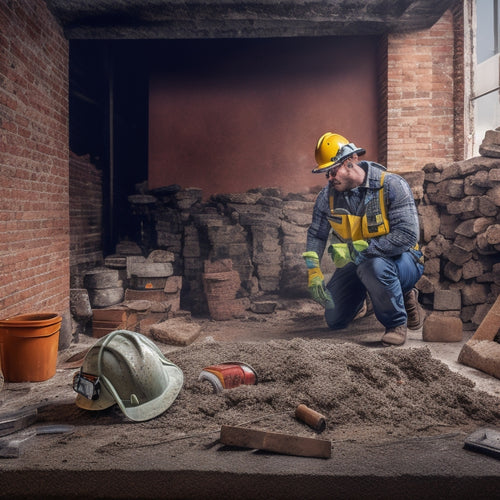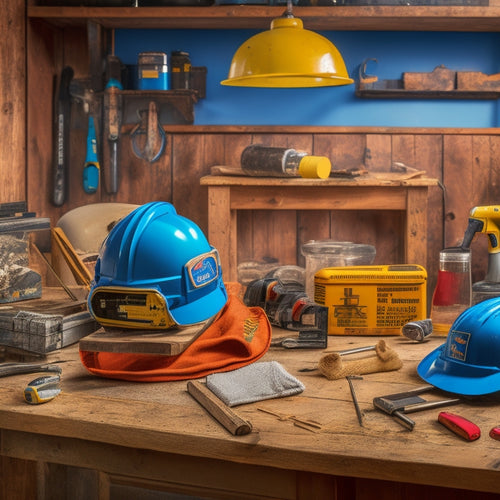
Top Picks for Home Renovation Concrete Pump Needs
Share
When tackling a home renovation project, selecting the right concrete pump is essential for efficient and safe concrete placement. You'll need to take into account factors like project size, concrete volume, and pumping distance to choose the ideal pump type, such as line, boom, truck-mounted, or trailer pumps. Key features to evaluate include horsepower, pressure rating, flow rate, and concrete volume capacity. Additionally, contemplate maintenance and efficiency aspects, as well as budget-friendly options and top brands. By understanding your specific needs, you'll be well on your way to finding the perfect concrete pump for your project, and uncovering the details that will make all the difference.
Key Takeaways
• For home renovations, consider compact and lightweight concrete pumps with easy operation, such as Sany HBT5006C-5S or Putzmeister BSA 1000.
• Evaluate pump performance requirements based on project demands, including horsepower, pressure rating, flow rate, and concrete volume capacity.
• Prioritize pump maintenance and safety precautions to extend pump lifespan, enhance performance, and ensure project efficiency.
• Opt for reputable brands like Schwing, known for reliability, durability, and ease of operation, to enhance project effectiveness.
• Renting a concrete pump can be a cost-effective solution for DIY projects, offering quality without the need for a large upfront investment.
Top Concrete Pump Brands
When selecting a concrete pump for your home renovation project, you'll want to evaluate top brands that offer reliable performance, durability, and ease of operation.
A reputable brand can make all the difference in guaranteeing your project is completed efficiently and effectively. You should research brands that have a proven track record of delivering high-quality products and exceptional customer service. Look for brands with a strong brand reputation, built on years of experience and a commitment to innovation.
In addition to brand reputation, you should also consider user reviews from previous customers. These reviews can provide valuable insights into the performance and reliability of a particular brand's concrete pumps.
Pay attention to reviews that mention ease of use, pump capacity, and overall satisfaction. Reputable brands will typically have a high rating and positive reviews across multiple platforms.
Pump Types for Home Renovation
You'll need to choose the right type of concrete pump for your home renovation project, as different pumps are suited for specific applications and job site constraints. The wrong pump can lead to delays, increased costs, and even safety hazards. There are several types of concrete pumps to take into account, each with its own strengths and weaknesses.
| Pump Type | Application | Advantages |
|---|---|---|
| Line Pumps | Small to medium-sized projects, such as sidewalks and patios | Low cost, easy to maneuver, and suitable for tight spaces |
| Boom Pumps | Large-scale projects, such as foundations and high-rise buildings | High pumping capacity, fast setup, and reduced labor costs |
| Truck-Mounted Pumps | Medium to large-sized projects, such as driveways and commercial buildings | Combines benefits of line and boom pumps, with high pumping capacity and easy maneuverability |
| Trailer Pumps | Small to medium-sized projects, such as pool decks and residential buildings | Affordable rental options, low pump maintenance, and easy to operate |
When selecting a pump, reflect on factors such as pump maintenance, rental options, and the specific needs of your project. By choosing the right pump, you can guarantee a successful and efficient concrete pumping operation.
Key Features to Consider
When selecting a concrete pump for your home renovation project, you'll need to take into account the key features that guarantee the pump meets your specific requirements.
You're looking for a pump that can handle the performance demands of your project, which is why you'll want to evaluate the pump's performance requirements and concrete volume capacity.
Pump Performance Requirements
Your concrete pump's performance requirements depend on the specific demands of your home renovation project, including the volume of concrete to be pumped, the distance it needs to be pumped, and the pressure required to overcome obstacles. To guarantee peak performance, consider the following key features:
| Feature | Description | Considerations |
|---|---|---|
| Horsepower | Measures the pump's power output | Higher horsepower for larger projects or longer distances |
| Pressure Rating | Maximum pressure the pump can handle | Higher pressure rating for thicker concrete or longer hoses |
| Flow Rate | Measures the volume of concrete pumped per minute | Higher flow rate for larger projects or faster completion |
| Pipe Diameter | Affects the flow rate and pressure | Larger pipe diameter for higher flow rates and pressures |
| Pump Speed | Affects the flow rate and pressure | Variable pump speed for peak performance and efficiency |
When selecting a concrete pump, consider these performance requirements and how they align with your project's needs. Additionally, don't forget to prioritize pump maintenance and safety precautions to guarantee a smooth and successful renovation. By choosing the right pump for your project, you'll avoid costly delays and guarantee a high-quality finish.
Concrete Volume Capacity
To guarantee your concrete pump can handle the demands of your home renovation project, consider the concrete volume capacity, which is the maximum amount of concrete the pump can process per hour, and evaluate it based on the project's specific requirements.
You'll want to confirm the pump can keep up with the concrete flow rate needed to complete the job efficiently. A pump with a higher concrete volume capacity can handle larger projects or those with complex concrete mix ratios.
When selecting a concrete pump, consider the project's concrete flow rate requirements and the pump's ability to maintain a consistent flow. It's essential to choose a pump that can handle the project's peak flow rate to avoid delays and confirm a smooth operation.
Additionally, don't forget to factor in pump maintenance tips, such as regular cleaning and lubrication, to maximize the pump's performance and extend its lifespan.
Concrete Pump Size Matters
When selecting a concrete pump for your home renovation project, you'll need to evaluate the pump's size and its implications on performance.
You'll want to determine the pump's output capacity, as it directly affects the rate at which concrete is poured, and the length of hose you'll need to reach those hard-to-access areas.
Additionally, the pipeline diameter size will impact the pump's overall efficiency and ability to handle specific concrete mixes.
Pump Output Capacity
Concrete pumping operations demand a precise calculation of pump output capacity to guarantee efficient and cost-effective project execution.
You need to take into account the volume of concrete required, the distance it needs to be pumped, and the pressure needed to overcome obstacles. A pump that's too small will struggle to meet demand, leading to delays and increased costs. On the other hand, a pump that's too large will waste resources and increase pump maintenance costs.
When selecting a pump, you should prioritize pump safety and take into account the maximum output capacity required for your project. A higher output capacity doesn't always translate to better performance.
You need to balance output capacity with pump safety features, such as pressure relief valves and safety sensors, to guarantee a safe and efficient operation. By accurately calculating your pump output capacity needs, you'll be able to complete your project on time, within budget, and with minimal downtime for pump maintenance.
Hose Length Options
You'll need to evaluate the hose length options to confirm the pump you've selected can efficiently deliver concrete to the desired location, taking into account the pump's size and the layout of your home renovation site.
A longer hose may seem convenient, but it can lead to increased pressure loss, reduced flow rates, and higher maintenance costs. Conversely, a shorter hose may require more repositioning, adding to labor costs and downtime.
It's crucial to strike a balance between hose length and pump performance. Consider factors like obstacle clearance, pump placement, and concrete flow requirements to determine the best hose length.
Additionally, be mindful of hose compatibility issues, making sure the hose is compatible with your pump and fittings. Regular hose maintenance tips, such as inspecting for damage and cleaning the hose regularly, can also help extend its lifespan and enhance performance.
Pipeline Diameter Size
Selecting the correct pipeline diameter size is vital, as it directly impacts the pump's ability to handle the required flow rate and pressure. A mismatch can lead to reduced performance, increased wear, and even equipment failure. When you're planning your home renovation concrete pump needs, you can't afford to overlook this significant aspect.
You'll want to take into account the following key factors when making your diameter selection:
-
Flow rate requirements: Confirm the pipeline can handle the required flow rate to maintain a consistent and efficient pumping process.
-
Pressure demands: Select a diameter that can withstand the maximum pressure required for your specific application.
-
Pipeline maintenance: A larger diameter may be necessary for easier maintenance and reduced risk of blockages.
- Pump compatibility: Verify the selected diameter is compatible with your concrete pump's design and capabilities.
Budget-Friendly Pump Options
By exploring the market, you can find pumps that balance performance with affordability, making home renovation projects more feasible without breaking the bank. For DIY projects, consider affordable rentals that can get the job done without sacrificing quality. These pumps are designed to handle small to medium-sized projects, providing a cost-effective solution for homeowners on a budget.
When selecting a budget-friendly pump, look for features such as compact design, lightweight construction, and easy operation. These pumps are often electric-powered, reducing fuel costs and minimizing environmental impact. Additionally, they typically require less maintenance, reducing downtime and extending their lifespan.
Some popular budget-friendly pump options include the Sany HBT5006C-5S, the Putzmeister BSA 1000, and the Schwing SP 500. These pumps offer reliable performance, ease of use, and affordability, making them ideal for homeowners tackling DIY projects or small-scale renovations.
Specialized Pumps for Unique Jobs
While budget-friendly pumps can handle most DIY projects, you're likely to encounter unique jobs that require more specialized equipment, such as pumping concrete up multiple stories or maneuvering tight spaces.
These specialized pumps are designed to tackle complex tasks with precision and efficiency.
When it comes to unique jobs, you'll need pumps that can adapt to challenging pumping techniques and job site logistics. Consider the following factors when selecting a specialized pump:
-
High-rise pumps: Designed for pumping concrete to extreme heights, these pumps are ideal for skyscrapers, high-rise buildings, and other tall structures.
-
Tight-space pumps: Compact and maneuverable, these pumps are perfect for pumping concrete in confined areas, such as basements or narrow alleys.
-
Long-distance pumps: Capable of pumping concrete over long distances, these pumps are ideal for large-scale projects that require concrete to be pumped across the job site.
- High-pressure pumps: Designed for high-pressure applications, these pumps can handle demanding tasks, such as pumping concrete through narrow pipes or up steep inclines.
Frequently Asked Questions
Can I Rent a Concrete Pump for a Small Home Renovation Project?
You're wondering if renting a concrete pump is a viable option for your small home renovation project. The answer is yes, you can rent a concrete pump for a small project.
When considering concrete pump rental options, think about the project's size, accessibility, and logistics. For small projects, a smaller pump or a trailer-mounted pump might be sufficient.
Weigh the costs and benefits of rental versus buying, and don't hesitate to consult with a professional to determine the best fit for your specific needs.
Do I Need a Commercial Driver's License to Operate a Concrete Pump?
When operating a concrete pump, you'll need to comply with concrete pump regulations and licensing requirements.
In most cases, you won't need a commercial driver's license (CDL) to operate a concrete pump, as it's considered a specialized piece of equipment.
However, you'll still need to meet specific licensing requirements, which vary by state and locality.
Be sure to check with your local authorities to determine the exact requirements for your project.
How Much Does It Cost to Maintain a Concrete Pump Annually?
Maintaining a concrete pump is like tuning a fine orchestra - it requires precision and attention to detail to avoid costly harmonies.
You'll need to budget for annual maintenance, which can range from $5,000 to $15,000, depending on factors like pump usage, wear and tear, and frequency of repairs.
Cost factors include labor, parts, and materials, so it's crucial to create a maintenance schedule to avoid unexpected expenses and keep your pump humming along.
Are Concrete Pumps Safe to Use in Residential Areas With Power Lines?
When operating a concrete pump in residential areas, you must prioritize safety above all.
You'll need to take necessary safety precautions to avoid accidents. One essential aspect is maintaining power line clearance, ensuring the pump's boom and hoses are at a safe distance from overhead power lines.
You should also conduct thorough risk assessments and implement measures to prevent accidental contact.
Can a Concrete Pump Be Used for Other Materials Besides Concrete?
Imagine a master chef, effortlessly whipping up a soufflé, then switching to craft a delicate meringue.
Similarly, a concrete pump can adapt to handle alternative materials with its pump versatility.
You'll find that these machines aren't one-trick ponies; they can efficiently pump mortars, grouts, and even self-leveling compounds.
In fact, some pumps can handle materials with varying viscosities and textures, making them incredibly versatile tools for your construction projects.
Conclusion
As you finalize your home renovation plans, it's likely that you're considering the best concrete pump for the job.
Coincidentally, you've just read the ultimate guide to concrete pumps, covering top brands, pump types, key features, and budget-friendly options.
Now, you're equipped to make an informed decision, ensuring your project stays on track and within budget.
With the right concrete pump, you'll be pouring foundations like a pro, and your dream home will be one step closer to reality.
Related Posts
-

Budget-Friendly Materials for Your Home Renovation Project
As you plan your home renovation project, finding budget-friendly materials is key to turning your design vision into...
-

7 Must-Have Safety Gears for Brick Wall Renovation
When renovating a brick wall, you'll face a multitude of hazards, making it essential to wear and use the right safet...
-

Top 3 Safety Essentials for DIY Renovations
When tackling a DIY renovation, you'll want to prioritize three essential safety items to protect yourself from poten...


